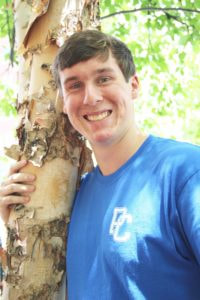|
The world we live in today is overrun by desires and notions that we must all live the perfect life and have everything figured out. If we mess up then we become outcasts by our peers, our friends, the media, or even society. We are told that not reaching these goals are caused by not working hard enough, not wanting it, that we are lazy, or that we intentionally did it to ourselves. We have turned into a world where egocentrism thrives as a result of this. As a culture, we masquerade in cities where the facades are beautiful but all the while the interiors are crumbling. This is how many of us live our lives, lost in the haze of the mountain just trying to get through another day without falling apart. How then can we find ourselves if we don’t even know where we are? Each week a new group of youth comes to Asheville wearing these lenses of this world. Many come in with notions that they are here to serve for others and to better the lives of our friends throughout Asheville. At first glance, they see the gardening at Emma Community Gardens, painting at the Veterans Restoration Quarters, or packaging of boxes at Manna Food Bank as ways of helping figure out the lives of the people of Asheville. This is because we see these acts directly affecting the lives of those experiencing homelessness or poverty. We assume that “they” themselves are the ones lost in the haze of the mountains and that “we” have already made it out since maybe we have a little more money, a roof over our heads, or even a car to drive. However, as the days go by each week, I see a change in the young people. As the youth begin learning the names and the stories of those experiencing homelessness or poverty in Asheville, the youth begin seeing “those people” for who they are: as regular people who are mothers, fathers, sons, daughters, sisters, and brothers. At the Free Food Market, we run outside of Kairos West Community Center, a mother walked up with her two young kids. She kept telling her kids that this was an outside grocery store so that they did not realize that their mom had to get this free food or they would have not of had a meal that night. My group broke down after hearing this and talking with the lady. They found out that she works just over the max hours for food stamps even though she does not make a living wage for her family. They found out she was a single mother. They found out that because of that she had to move her hours around the times that her kids were at school so that every night she could tuck them in to go to sleep. They found out she is just a regular person, like each of us, stumbling through the haze of life. At the end of the week, the kids come up to me and say how they realized it is ok to not be perfect and not have everything figured out. It is ok to mess up and that our friends who are experiencing homelessness or poverty are just like us. The kids say they see that they are not the “perfect ones” but are just as flawed as those they have met. Like Shannon at 12 Baskets always says, “We all come to these spaces not just as ‘haves’ giving to others that are ‘have nots.’ However, we are all, each of us, ‘haves’ and ‘have nots.” We all come to these spaces to have our needs filled.” We are all wandering through the haze on the mountain. The only way for us to find our way, in a world that roots against us, is through community. This community, I have learned, must be of different people because that is the only way we can all help each other. We all bring something different to the table as gifts and as needs. This difference can be through race, ethnicity, socio-economic levels, different backgrounds, and even different views on life. This summer, I have seen our youth, and myself, be transformed by the new culture we are creating. This culture is a community of love where we all recognize each other and realize that we are all in the haze together. This love helps remind us time and time again that we are all the Children of God no matter who you are or where you come from. I have learned we are never alone, and that together as a community we can find our way down the mountain and out of the haze. Now the notions of “having everything together” or “egocentrism” are not the center or a concern of our new community. At the center now is a rejoicing and a passion for each other to live together in harmony and in peace.
0 Comments
Leave a Reply. |
Archives
July 2024
Categories |
Youth Mission Co
Contact UsPO Box 2988
Asheville, NC 28802 (828 )231-4635 Mon - Fri 9 am - 5 pm EST |
SIGN UP FOR YMCO NEWSLETTER |
© Youth Mission Co. All rights reserved.

 RSS Feed
RSS Feed
